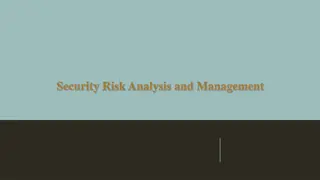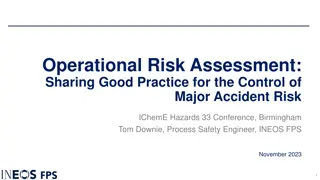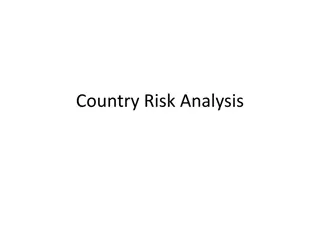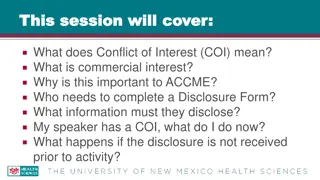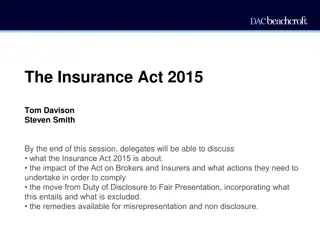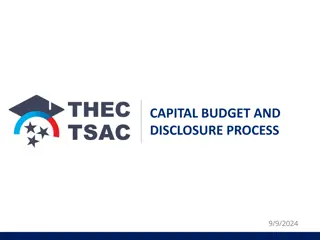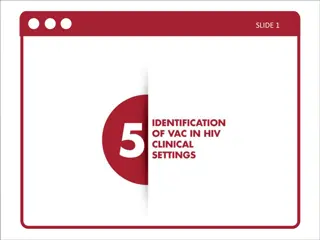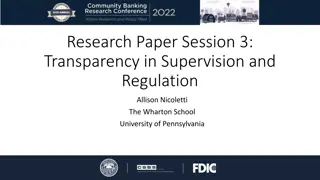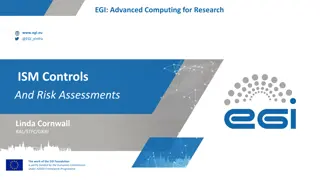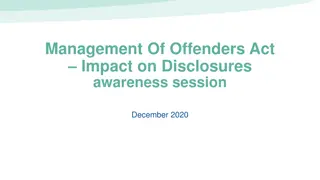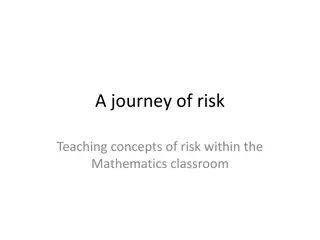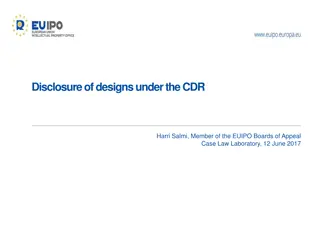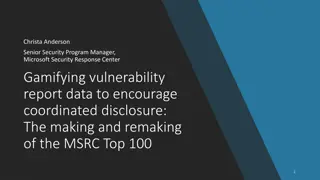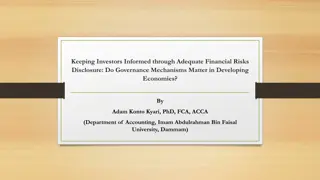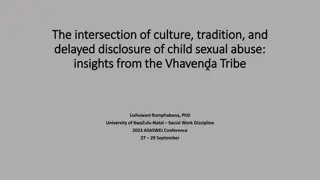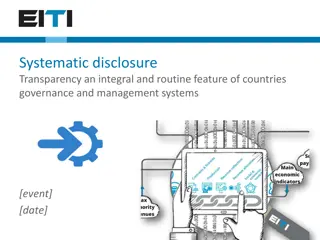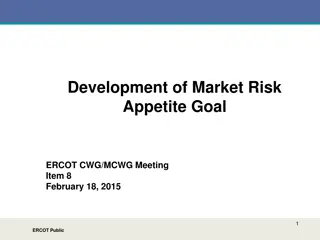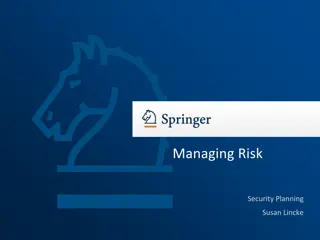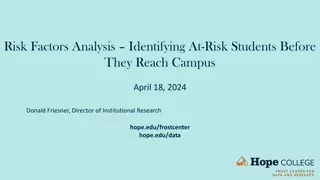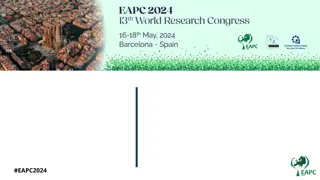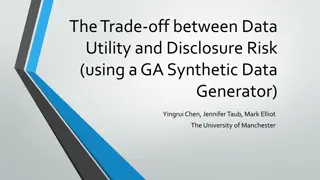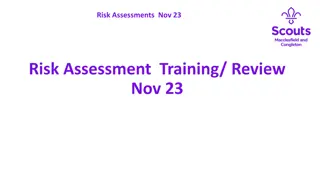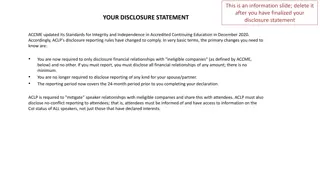Comprehensive Overview of Security Risk Analysis and Management
Explore the essential aspects of security risk analysis and management, including risk identification, assessment, and control techniques within an Information Security (InfoSec) context. Learn about the purpose of risk management, steps involved in a risk management plan, asset identification and c
0 views • 22 slides
Understanding Risk Management in Environmental Geography and Disaster Management
Risk management in environmental geography and disaster management involves assessing the potential losses from hazards, evaluating vulnerability and exposure, and implementing strategies to mitigate risks. It includes calculating risk, dealing with risk through acceptance, avoidance, reduction, or
1 views • 10 slides
Introduction to Flood Risk Assessment with HEC-FDA Overview
This presentation delves into flood risk assessment using HEC-FDA software, covering topics such as defining flood risk, components of uncertainty, consequences of flood risk, and methods to assess flood risk including hydrology, hydraulics, geotechnical, and economics. It explores the intersection
6 views • 39 slides
Operational Risk Assessment for Major Accident Control: Insights from IChemE Hazards 33 Conference
This content provides valuable insights into the importance of Operational Risk Assessment (ORA) in managing major accident risks in high hazard industries. It covers the necessity of ORA, identifying changes, risk assessment, and key success factors. Real-life examples like the Buncefield Terminal
0 views • 22 slides
Understanding Agricultural Risk Management in the Face of Natural Disasters
Exploring the impact of natural disasters on agricultural economics, this content delves into the challenges faced by farmers and the approaches available for managing risks. From analyzing the Billion-Dollar Disasters in the US to discussing private and public risk management provisions, the conten
3 views • 20 slides
Understanding Country Risk Analysis in International Business
Country risk analysis is crucial for multinational corporations (MNCs) to assess the potential impact of a country's environment on their financial outcomes. It includes evaluations of political and economic risks in foreign operations. Sovereign risk, political risk characteristics, and factors are
1 views • 61 slides
Understanding Conflict of Interest in ACCME Accredited Activities
Conflict of Interest (COI) refers to financial relationships that may create biases in Continuing Medical Education (CME) activities when individuals have ties to commercial interests and can influence the content. ACCME requires disclosure to prevent potential bias in CME content. Non-disclosure ca
0 views • 18 slides
Federal Agencies Guidance on Ethics, Compliance, and Audit Services under NSPM-33
The White House OSTP released guidance for federal agencies to implement NSPM-33 focusing on disclosure requirements, digital identifiers, consequences for violations, information sharing, and research security programs. The guidance emphasizes supporting open scientific inquiry and nondiscriminator
0 views • 10 slides
Project Risk Management Fundamentals: A Comprehensive Overview
Project risk management involves minimizing potential risks and maximizing opportunities through processes such as risk management planning, risk identification, qualitative and quantitative risk analysis, risk response planning, and risk monitoring and control. Quantitative risk analysis assesses t
0 views • 41 slides
Understanding the Impact of the Insurance Act 2015 on Brokers and Insurers
The Insurance Act 2015 brings significant changes in insurance contract law, shifting from Duty of Disclosure to Fair Presentation. This Act influences both Brokers and Insurers, requiring clear and accessible disclosure of material circumstances. The remedies for misrepresentation and non-disclosur
0 views • 19 slides
Updated Disclosure Rules for Financial Relationships in Continuing Education
ACCME updated its Standards for Integrity and Independence in Continuing Education, requiring disclosure of financial relationships with specific "ineligible companies" by all involved parties. The rules aim to enhance transparency and mitigate conflicts of interest in accredited continuing educatio
1 views • 5 slides
Understanding Disability Disclosure in Employment: Practical and Ethical Considerations
This presentation touches on the practical and ethical issues supported employment professionals face when dealing with disability disclosure. The agenda includes ADA provisions, successful disclosure strategies, the professional's role in the process, and available resources. The session covers dis
0 views • 33 slides
Understanding Disclosure of Adverse Clinical Events in Healthcare
Exploring the essential elements of disclosing adverse clinical events to patients and families in healthcare settings. It covers why disclosure is crucial, barriers to disclosure, triggers for disclosure, policies and procedures, and the other important aspects related to the disclosure process.
0 views • 8 slides
Understanding the Capital Budgeting and Disclosure Process
This content provides a comprehensive overview of the capital budgeting and disclosure process, focusing on fiscal years, budget terms, and the sequential steps involved in the capital budget process. It explains the timeline from the Governor's capital budget release to the final approval by the go
2 views • 23 slides
Child Violence Awareness Module
This module focuses on equipping healthcare workers with the skills to identify and support children at risk of violence. It covers the importance of disclosure, reasons for non-disclosure, and introduces the Child Protection Enquiry Tool (CPET) to aid in recognizing signs of violence in children. S
0 views • 15 slides
Example of COI Disclosure Formats in Academic Presentations
These images provide examples of Conflict of Interest (COI) disclosure formats for oral and poster presentations in academic settings. They outline how authors can disclose any potential COIs in relation to their work over the past three years, including details on employment, stock ownership, paten
1 views • 4 slides
Detailed Guidance and Requirements for Implementing NSPM-33
The update provides detailed guidance on implementing NSPM-33's disclosure requirements and other provisions discussed in the January 2022 CLASP Meeting. It includes areas such as disclosure requirements, digital persistent identifiers, consequences for violations, information sharing, and research
1 views • 19 slides
Transparency in Banking: Examining Disclosure and Regulation
Discussion on the importance of transparency in the banking industry, focusing on the level of information disclosure by banks and its impact on market discipline, lending practices, and regulatory intervention. Papers explore different facets of transparency, including the disclosure audience, natu
0 views • 10 slides
Understanding Risk Concepts and Management Strategies in Finance
Explore the essential concepts of risk in finance, such as risk definition, risk profiles, financial exposure, and types of financial risks. Learn about risk vs. reward trade-offs, identifying risk profiles, and tools to control financial risk. Understand the balance between risk and return, and the
0 views • 18 slides
Risk and Return Assessment in Financial Management
This comprehensive presentation explores the intricacies of risk and return assessment in the realm of financial management. Delve into understanding risk concepts, measuring risk and return, major risk categories, and the impact of risk aversion on investment decisions. Gain insights into the manag
0 views • 62 slides
Risk Management and Security Controls in Research Computing
The European Grid Infrastructure (EGI) Foundation conducts risk assessments and implements security controls in collaboration with the EOSC-hub project. The risk assessments involve evaluating threats, determining likelihood and impact, and recommending treatment for high-risk threats. Results from
0 views • 13 slides
Risk Management & MPTF Portfolio Analysis at Programme Level for UN Somalia
This session delves into the world of risk management and portfolio analysis at the programme/project level, specifically focusing on the Risk Management Unit of the United Nations Somalia. It covers enterprise risk management standards, planned risk management actions, the role of RMU, joint risk m
0 views • 30 slides
Alcohol and Cancer Risk: Understanding the Links
Alcohol consumption is linked to an increased risk of various cancers, including mouth, throat, esophagus, breast, liver, and colorectal cancers. Factors such as ethanol, acetaldehyde, nutrient absorption, estrogen levels, and liver cirrhosis play a role in this risk. Even light drinking can elevate
0 views • 17 slides
Evolution of Vulnerability Disclosure Practices
The history of vulnerability disclosure, from the early days of mailing lists and zines to the emergence of Full Disclosure and the debates around anti-disclosure groups. The timeline covers key events like the Morris worm, Code Red, the founding of Bugcrowd, and more, illustrating the evolution of
0 views • 11 slides
Impact of Management of Offenders Act on Disclosure Awareness Session
On 30 November 2020, new legislation including the Age of Criminal Responsibility (Scotland) Act 2019 and the Management of Offenders (Scotland) Act 2019 came into force, transforming the disclosure system in Scotland. These changes raise the age of criminal responsibility, reduce rehabilitation per
0 views • 10 slides
Understanding Risk Concepts in the Mathematics Classroom
Risk is a concept integral to decision-making in various aspects of life. This resource explores how risk is defined in the real world, its relevance in the classroom, and strategies for teaching risk literacy to students. It delves into the multiple definitions of risk, risk analysis, and the emoti
0 views • 62 slides
Understanding Disclosure of Designs under CDR - Key Insights
The article explores the disclosure of designs under the Community Design Regulation (CDR) and Community Design Invalidity Regulation (CDIR). It discusses the criteria for public availability, evidence required for proving prior disclosure, and the basic rules for establishing the disclosure of a pr
0 views • 9 slides
Gamifying Vulnerability Reporting for Coordinated Disclosure at Microsoft Security Response Center
Christa Anderson, a Senior Security Program Manager at Microsoft's Security Response Center, discusses the importance of gamifying vulnerability report data to encourage coordinated disclosure. The MSRC Top 100, announced at Black Hat USA, plays a crucial role in the public credit strategy by recogn
0 views • 13 slides
Governance Mechanisms and Financial Risks Disclosure in Developing Economies
Examining the impact of governance mechanisms on financial risk disclosure in developing economies, this study delves into theories, literature reviews, findings, policy implications, and conclusions. The research emphasizes the importance of adequate risk disclosure for investor trust and regulator
0 views • 9 slides
The Use of Self in Probation Practice: Understanding Self-Disclosure and Its Implications
Explore the concept of self-disclosure in probation practice, examining different methods, findings, and implications. Discover the two schools of thought regarding self-disclosure and delve into the various realms and subtypes of self-disclosure practices. Gain insights into the forms of self-discl
0 views • 25 slides
Understanding Cultural Influence on Delayed Child Sexual Abuse Disclosure in the Vhavena Tribe
Exploring the intersection of culture, tradition, and delayed disclosure of child sexual abuse within the Vhavena Tribe. The study delves into the complexities of disclosure, the unique context of CSA in cultural norms, and behaviors, guided by the Afrocentric theory. Methodology involves interviews
0 views • 15 slides
Enhancing Governance through Systematic Disclosure and Transparency
Systematic disclosure and transparency play a crucial role in the governance and management systems of countries. This involves routine disclosure of information, such as financial data, to promote accountability and address gaps in information. The EITI Standard emphasizes the importance of mainstr
0 views • 23 slides
Understanding Organizational Risk Appetite and Tolerance
Explore the development of market risk appetite goals and how to define and establish organizational risk tolerance. Learn about the Classic Simplified View of Risk Tolerance and different methods to determine risk appetite. Discover the importance of assessing market risk impact and aligning risk t
0 views • 8 slides
Developing a Risk Appetite Culture: Importance and Framework
Risk management plays a critical role in the success of corporations, with strategy and risk being intertwined. This presentation delves into definitions of key terms such as risk appetite, the Risk Appetite Cycle, characteristics of a well-defined risk appetite, and the importance of expressing ris
0 views • 31 slides
Security Planning and Risk Management Overview
This content provides an in-depth exploration of managing risk, security planning, and risk appetite in the context of cybersecurity. It covers essential concepts such as risk management process, threat types, risk analysis strategies, vulnerability assessment, and risk mitigation techniques. The ma
0 views • 73 slides
Risk Factors Analysis: Identifying At-Risk Students Before They Reach Campus
Risk Factors Analysis aims to identify students at risk of attrition before they even arrive on campus by evaluating academic, financial, minority, and first-generation factors. The method involves choosing specific risk factors, tracking historical prevalence, calculating relative risk, and predict
0 views • 15 slides
Conflict of Interest Disclosure for EAPC 2024 Congress
This disclosure statement outlines the conflict of interest policy for speakers at the EAPC 2024 Congress. Speakers are required to disclose any affiliations or financial interests that may potentially influence their presentations. The purpose of the disclosure is to inform attendees so they can ev
0 views • 4 slides
Understanding the Trade-off between Data Utility and Disclosure Risk
This study explores the balance between data utility and disclosure risk using a GA synthetic data generator. The authors delve into measuring utility and risk, emphasizing structured categorical data. They define synthetic data, discuss utility assessment methods, and outline how to measure data ut
0 views • 30 slides
Comprehensive Risk Assessment Training Overview
In this risk assessment training session held on November 23, participants reviewed the process of writing and reviewing risk assessments to enhance the quality of assessments for safer scouting experiences. The training aimed to improve leaders' skills and confidence in risk assessment practices wh
0 views • 37 slides
New Disclosure Rules for Continuing Education
ACCME updated its Standards for Integrity and Independence in Accredited Continuing Education in December 2020, leading to changes in ACLP's disclosure reporting rules. Key changes include reporting only financial relationships with "ineligible companies," extending the reporting period to 24 months
0 views • 5 slides
